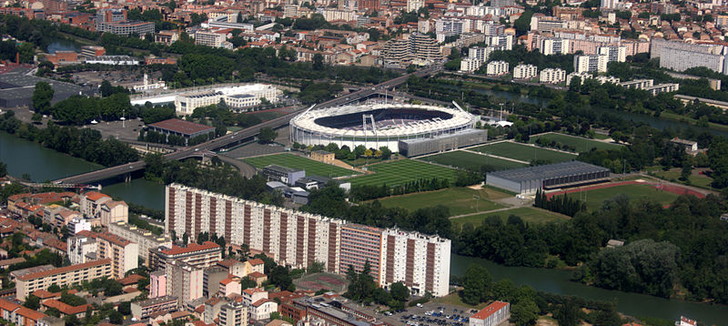Stadium Municipal de Toulouse: Toulouse
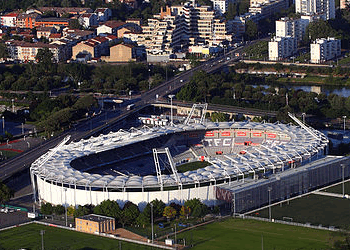
By Caroline Léna Becker (Own work) [CC BY 3.0], via Wikimedia Commons
Stadium Municipal de Toulouse is the official name of Toulouse Football Club’s home ground. It has been their home since the club was founded in 1970. It is only the twelfth largest stadium in France but the largest multi-purpose stadium in the city of Toulouse. Though it is the home of Toulouse FC, it is also used for major rugby games, especially test matches of the French national rugby union side.
Toulouse Football Club are often known as the more simplistic Toulouse or even just TFC. Though they are currently playing in the top-tier of French football they have never won it. They have won Ligue 2, the second division, three times, the most recent of which was in 2003. They have also won the Coupe de France once, in 1957. The club’s home kit is violet, which is believed to be a reference to the nickname of the city, la Cité des violettes, or the City of Violets.
Stats
| Stadium Municipal de Toulouse Stats | |
|---|---|
| Year Opened | 1937 |
| Capacity | 33151 |
| Average Attendance | 17068 |
| Record Attendance | 39450 (US Carmaux vs Stadoceste Tarbais, rugby union, 1951) |
| Pitch Size | 105 x 68 (7140) |
| Nickname | Little Wembley |
| Owner | City of Toulouse |
| Clubs Hosted | Toulouse FC |
| First Fixture | Unknown |
| Toulouse Stats | |
|---|---|
| Year Founded | 1970 |
| Nickname | Le Téfécé, Le Pitchouns, Le Violets |
| Club Mascot | Unknown |
| Rivals | FC Girondins de Bordeaux, Toulouse Fontaines |
| Kit | Purple & White (Home) / Pink & Purple (Away) |
| Training Ground | Allées Gabriel Bienes |
| Shirt Sponsor | LP Promotion |
| Team Owner | RedBird Capital Partners |
| Record Goalscorer | Robert Pintenat (73) |
| Record Appearances | Dominique Arribagé (335) |
Stadium Municipal de Toulouse Photos
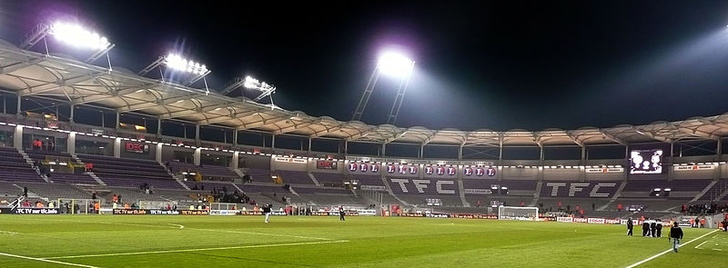
By Luc-Éric Manneville Lucio fr (Self-photographed) [GFDL
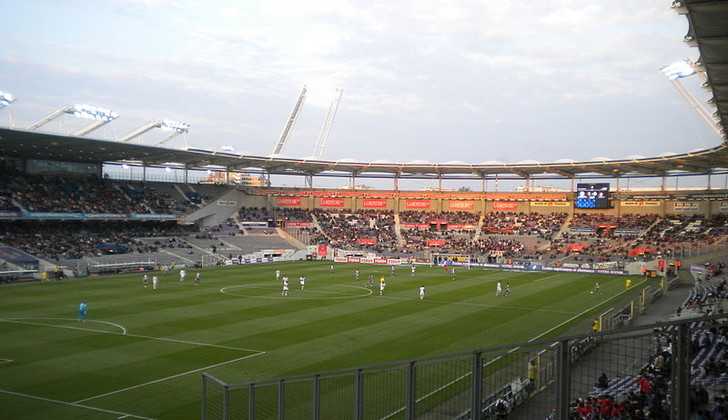
By Fantafluflu (Own work) [CC BY-SA 3.0]
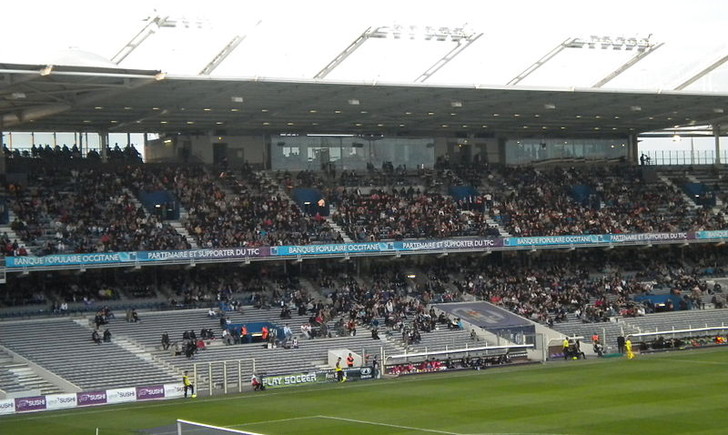
By Fantafluflu (Own work) [CC BY-SA 3.0]
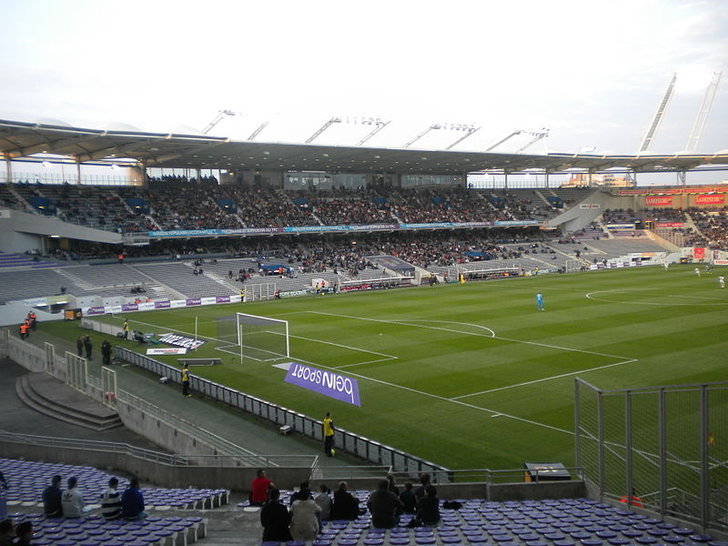
By Fantafluflu (Own work) [CC BY-SA 3.0]
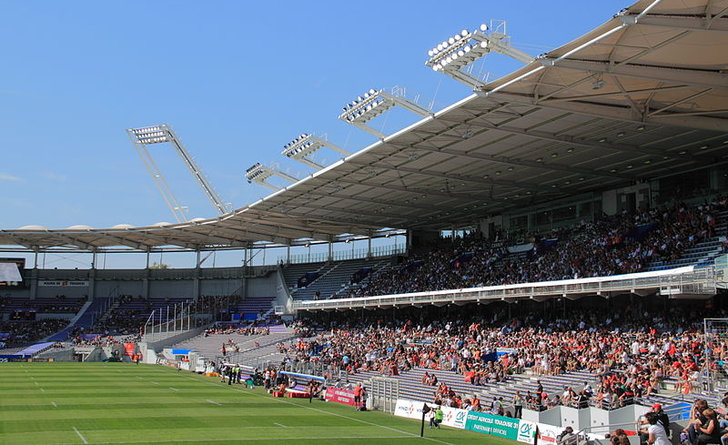
By Léna (Own work) [CC BY 3.0]
Stadium Municipal de Toulouse Seating Plan and Where to Sit
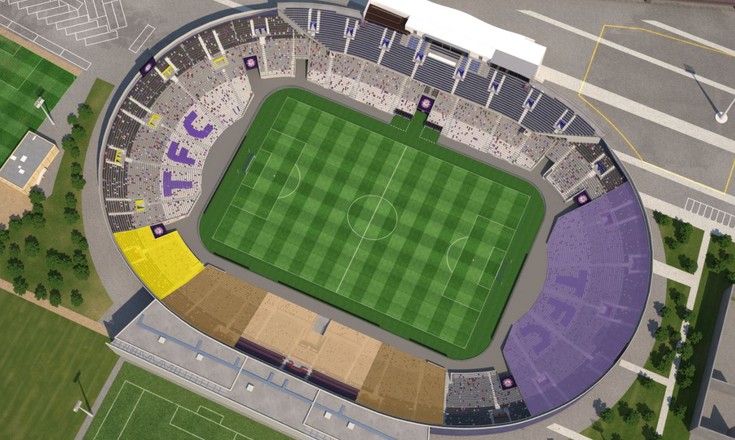
Despite being built during a time when building stadiums in the ‘English style’ of four separate stands was all the rage, the Stadium Municipal is actually built in a bowl style of continuous seating. The two end stands are single stands, whilst the side stands are two-tiered.
Even though the stadium offers a bowl of continuous seats it is still split into four different sections. Though there are more specific names of certain areas the section are, for ease, named after the geographical area that the stands are located in. There is the Tribune Nord, the Tribune Sud, the Virage Est and the Virage Ouest. Just in case you’re not too sure about your French they are, in order, the North, South, East and West stands.
Toulouse Ticket Prices
The cost of tickets to Toulouse matches varies depending on a number of factors. The opposition team that Toulouse will face will impact the cost of tickets, as will the area of the stadium in which you want to sit. For example as 2022 Ligue 2 game against Amiens cost between €10 and €30 for full priced adults and €8 to €25 for concessions. There are cheaper seats for youngsters too.
How To Get Toulouse Tickets
Prices for tickets to Toulouse matches are released about twenty days before the game itself. One of the best ways to buy tickets for the matches is via the club’s official website. You can phone the club’s ticket booking line directly, too. Tickets are also sold through the national ticketing network France Ticket, which is present at branches of Carrefour, Fnac and Geant Casino. Finally, you can buy tickets from the box office near the Capitol Square in Toulouse itself.
Where to Buy
Getting To Stadium Municipal de Toulouse
How many stadiums do you know that are situated on an island in the middle of a river near to the centre of the city it’s based in? The River Garonne flows near to the city of Toulouse and in the middle of the river is an island that does just that as far as the Stadium Municipal de Toulouse is concerned. It’s about three kilometres away from the heart of the city, but the transport options to the stadium are plentiful.
Train – Getting the train to Toulouse is a reasonably simple, if long, thing to do. You can get the Eurostar from London St. Pancras International to France before jumping an internal train from the City of Love through to the Pink City.
The main station in the city is the Gare de Toulouse-Matabiau, so that’s where you’ll be heading. It is connected to the Toulouse Metro system and you’ll be able to jump on that to get to near to the ground. The Yellow Line will stop at either St. Michel or Empalot Metro Stations and from there you’ll have a 15 minute walk or so to the stadium.
Bus – There is a free shuttle service that goes from Esquirol Metro Station to the two closest Metro Stations. Bus 12 goes from the historic centre of Toulouse to Basso Cambo, right next to the ground. The number 38 also runs to the Eastern bank of the river near to the stadium.
Car – Toulouse is a large city with a ring road encircling it, therefore you can drive pretty much anywhere easily enough. You can get from the centre of Toulouse to the stadium via Boulevard du Maréchal Juin, via Allée Jules Guesde and Boulevard du Maréchal Juin or via Quai de Tounis.
By Air – Toulouse-Blagnac Airport is around seven kilometres from the ground and is the place that most international cities fly to when they are connecting to the Mid-Pyrénées region. There is a shuttle bus service operated by Tisséo that will take you into Toulouse itself.
Taxi – A taxi from the centre of Toulouse out to the ground will take about ten minutes and should cost somewhere in the region of €15. As with any taxi journey, of course, if you get stuck in traffic then it will take longer and cost more, so public transport might still be your best bet.
Parking Near Stadium Municipal de Toulouse
There is parking at the stadium and you can buy parking permits from the club shop in advance of the match. There are also numerous public parking lots near to the ground that you might want to consider using if the official parking lot is not an option.
Useful Resources
Stadium Municipal de Toulouse Hotels
Toulouse is in the heart of rugby country in France, so they’re used to an influx of visitors to the city, meaning that there are plenty of hotel options around the city. Here are some selections for you to start with:
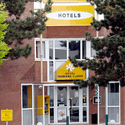
Première Classe Toulouse Sud - Labège Innopole - £58+
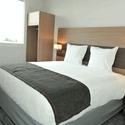
Dios Hôtel - Toulouse Nord - £100+
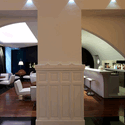
Le Grand Balcon - £400+
Pubs and Bars Near Stadium Municipal de Toulouse
Much like with the hotels, the fact that Toulouse is so used to welcoming rugby fans means that it is set-up to give those fans a place to go for a drink or two before the game. Here are some places you might want to consider:
Le Dubliners
The London Town
The Black Lion
Facilities
Despite the fact that it was built in the 1930s the Stadium Municipal de Toulouse has been renovated a number of times since then. The renovations have brought it bang up to date, so most of the facilities you’ll find there are exactly the same as you’d find in most top stadiums. From places to buy yourself a beer through to stalls to pick up a bite to eat, there’s little you won’t be able to get inside in the ground.
Hospitality
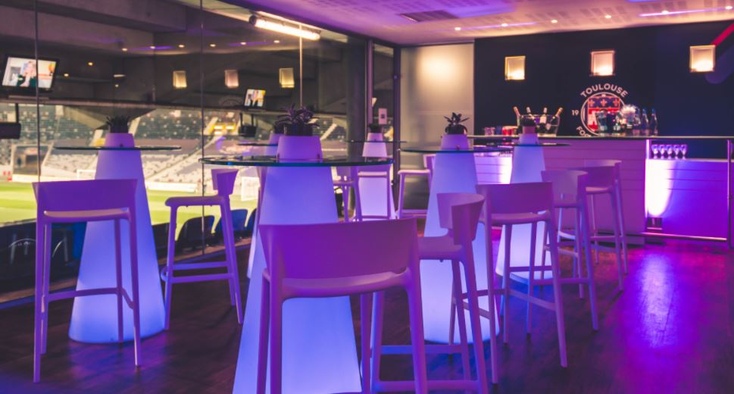
Like virtually all top-end stadiums, there are a number of hospitality options at the Stadium Municipal de Toulouse. From executive boxes through to VIP lounges, if you’re hoping to enjoy the most exquisite match-going experience then you won’t be disappointed by the options available to you from Toulouse FC.
Private Hire
Most top clubs realise that allowing sections of their stadium to be used for private hire purposes is an excellent income generator and Toulouse FC are no different. If you want to find out about the different options and configurations available at the ground then your best bet is to contact the club directly and ask them what they can do for you.
Stadium Tours & Museum
At the time of writing there aren’t any tours of the Municipal Stadium available. It’s entirely possible that the football club and the city of Toulouse might realise the commercial potential of allowing tours at some point in the near future, so we’ll keep an eye on that and let you know if anything changes.
About Toulouse
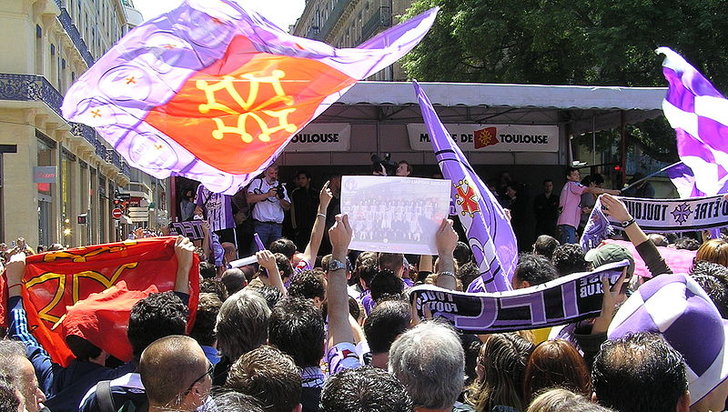
Les Pitchouns have played in European competitions five times during their history and in 2008 they qualified for the Champions League for the first time since the club was formed. It hasn’t all been sunshine and lollipops for the French club, however. They went into bankruptcy in 2001 and found themselves relegated to the Championnat National as a consequence. They were taken over by Olivier Sandron at that time and the French businessman has helped to propel them back to the top-tier of French football in the preceding years.
Toulouse have acted as something of a springboard for numerous players who are now reasonably well known. Fabien Barthez, who went on to play for Manchester United and won both the World Cup and European Championships as the French national team’s number one goalkeeper, began his career here, for example. The club began life as Union Sportive Toulouse but changed their name to Toulouse Football Club in 1977 and haven’t looked back since.
Stadium Municipal de Toulouse History
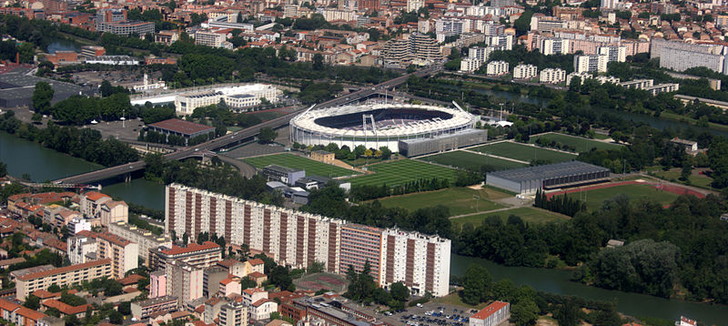
Located as it is in the heart of French rugby country, the Stadium Municipal de Toulouse is perhaps better known for the rugby it hosts than the football. The ground is used for the matches of the French national rugby union team as well as the Heineken Cup matches of Stade Toulousain. Unlike a number of football grounds in France it is used solely for either rugby or football. Consequently there is no athletics track around the perimeter of the pitch.
Though the ground was completed in 1937, just in time to be used for France’s hosting of the 1938 FIFA World Cup, it has undergone several major renovations. As it was to be used for the 1998 World Cup it was redeveloped extensively in 1997. It was also used as a host ground for the 2007 Rugby World Cup and a number of changes were made in advance of that competition. There were also numerous upgrades made to the stadium in advance of the European Championships in 2016, when the ground was used for a group stage match.
Future Developments
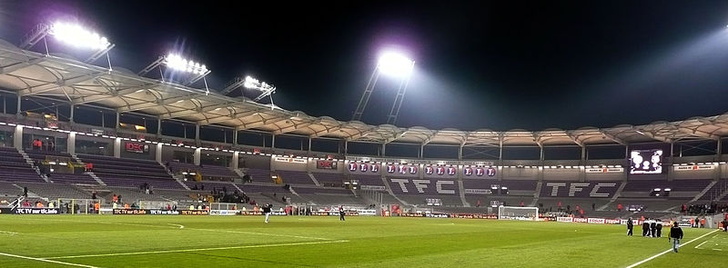
The changes made to the ground ahead of the 2016 Euros were reasonably significant, so there are unlikely to be many more alterations in the near future.

